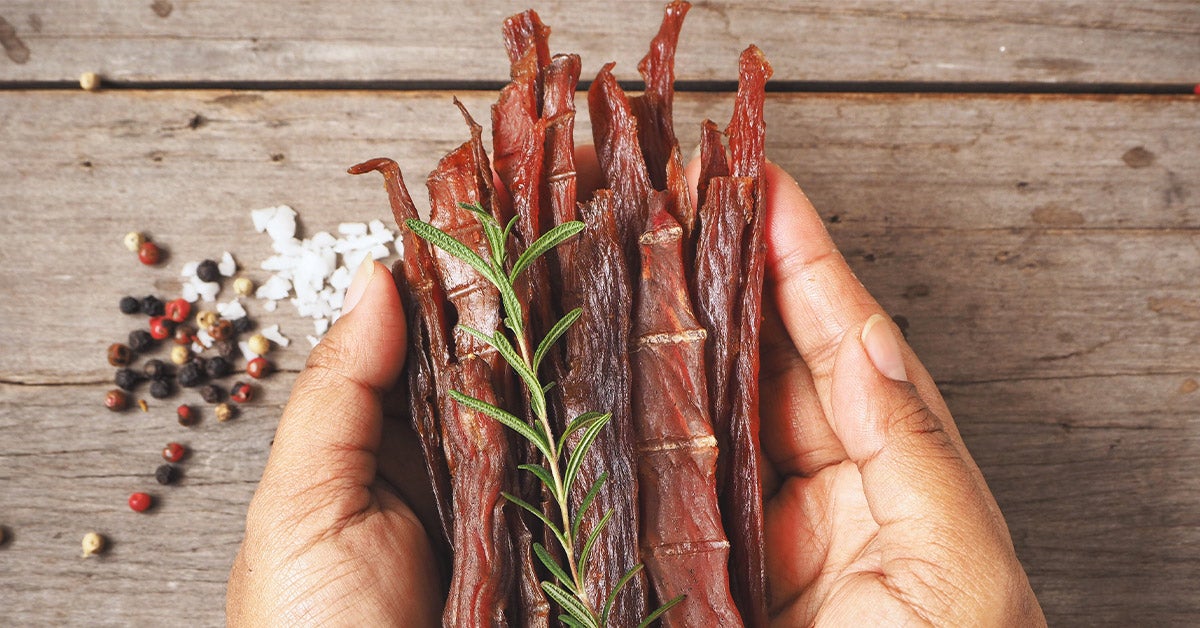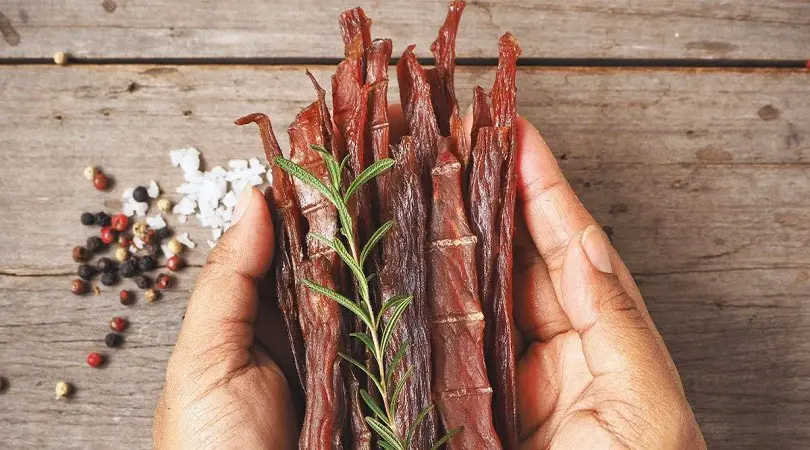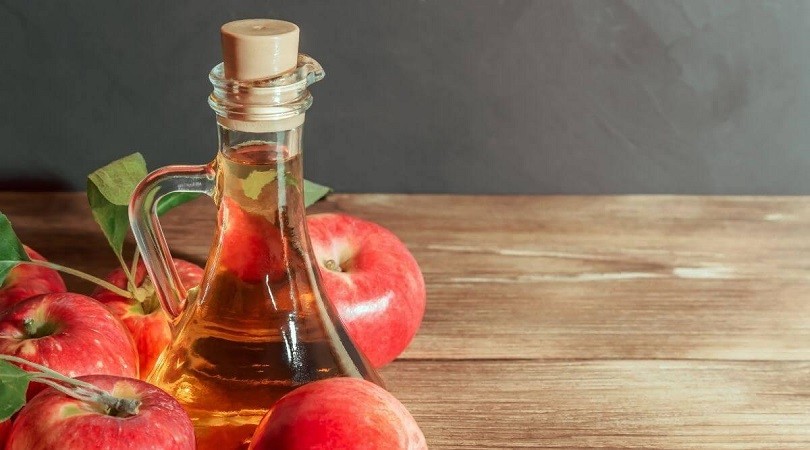Last Updated on January 6, 2025
Yes, you can eat jerky while pregnant. Jerky is safe to consume during pregnancy if properly cooked and stored.
Jerky is a popular snack made by dehydrating or drying lean meat. It is typically high in protein and low in fat, making it a nutritious choice for pregnant women. However, there are a few factors to consider when eating jerky during pregnancy.
First, it is important to ensure that the jerky is properly cooked to kill any harmful bacteria. Pregnant women are more susceptible to foodborne illnesses, so extra caution should be taken. Additionally, it is crucial to check the ingredients and avoid jerky that contains excessive amounts of sodium or other additives. Finally, pregnant women should consume jerky in moderation as part of a balanced diet. As always, it is best to consult with your healthcare provider regarding your specific dietary needs during pregnancy.

Credit: www.healthline.com
Related: Can You Eat Pastrami While Pregnant?
Is Jerky Safe For Pregnant Women?
Is It Safe To Consume Jerky During Pregnancy?
During pregnancy, it’s natural for women to pay extra attention to their diet and be cautious about certain food choices. One such concern that often comes up is whether it is safe to consume jerky while pregnant. Let’s dive into the topic and discuss the potential risks associated with eating jerky during pregnancy.
The Potential Risks Of Eating Jerky While Pregnant
When it comes to jerky consumption during pregnancy, there are a few factors to keep in mind. Here are the key points to consider:
- High sodium content: Jerky is typically high in sodium, which can lead to water retention and high blood pressure during pregnancy. It is advisable to limit sodium intake to maintain optimal health.
- Nitrate and nitrite preservatives: Some jerky products may contain nitrate and nitrite preservatives. When these substances are consumed in excessive amounts during pregnancy, they can potentially harm the developing fetus. It’s important to read product labels and choose jerky that is free from these additives.
- Foodborne illnesses: Jerky is a dried meat product and can be at risk of contamination if not processed and stored properly. Pregnant women are particularly vulnerable to foodborne illnesses due to changes in their immune system. It is crucial to ensure that jerky is stored and handled safely to minimize the risk of bacterial contamination.
- Allergens: While not directly related to pregnancy, it’s worth mentioning that certain jerky products may contain common allergens such as soy, gluten, or nuts. If you have known allergies or intolerance, it is essential to read labels carefully to avoid any adverse reactions.
Understanding The Safety Concerns Associated With Jerky
To ensure the safety of jerky consumption during pregnancy, it is advisable to consider the following guidelines:
- Moderation is key: As with any food, moderation is important. It is recommended to consume jerky in moderate amounts and be mindful of overall sodium intake.
- Choose wisely: Opt for jerky that is low in sodium and free from additives such as nitrate and nitrite preservatives.
- Proper storage: If making homemade jerky, follow appropriate food safety guidelines for drying, storing, and handling. For store-bought jerky, check the packaging for proper storage instructions and consume within the recommended time frame.
- Source quality products: Look for reputable brands or local producers known for their safe processing methods. Ensure the jerky is made from high-quality meat.
Remember, it is always best to consult with your healthcare provider before making any dietary changes or consuming potentially risky foods during pregnancy. They can provide personalized guidance based on your individual needs and medical history.
While jerky can be enjoyed during pregnancy, it is important to be mindful of potential risks. By choosing low-sodium, additive-free options and ensuring proper storage and handling, pregnant women can safely enjoy jerky as a protein-rich snack.
Nutritional Benefits Of Jerky For Pregnant Women
High Protein Content In Jerky And Its Benefits During Pregnancy
Jerky is an excellent source of high-quality protein, which is essential for the healthy development of both the mother and the growing baby during pregnancy. Here are some key points about the high protein content in jerky and its benefits:
- Protein plays a crucial role in the formation of cells, tissues, and organs in the fetus.
- It helps in the production of antibodies, enzymes, and hormones, which are essential for the overall growth and development of the baby.
- Protein also aids in the repair and regeneration of cells in the mother’s body.
- The high protein content in jerky helps in maintaining muscle mass and preventing muscle loss during pregnancy.
- It provides a satiating effect, which helps in combating hunger pangs and cravings.
Essential Vitamins And Minerals Found In Jerky
Apart from being a great source of protein, jerky also offers various essential vitamins and minerals that are beneficial for pregnant women. Here are a few important ones to note:
- Iron: Jerky contains a significant amount of iron, which is crucial for the production of red blood cells and the prevention of anemia.
- Zinc: This mineral plays a vital role in the development of the baby’s immune system and helps in cell division and growth.
- Vitamin b12: Jerky is rich in vitamin b12, which is important for maintaining nerve health, dna synthesis, and the formation of red blood cells.
- Vitamin d: It helps in the absorption of calcium, which is necessary for the development of the baby’s bones and teeth.
- Omega-3 fatty acids: Some types of jerky, such as salmon jerky, are a good source of omega-3 fatty acids, which are crucial for brain development and reducing the risk of certain pregnancy complications.
Related: Can You Get A Divorce While Pregnant?
Why Jerky Can Be A Convenient Snack Option For Pregnant Women
Pregnancy can sometimes bring about cravings and hunger pangs, making it important to choose convenient and nutritious snack options. Jerky fits the bill perfectly, and here’s why:
- Portability: Jerky is a compact and lightweight snack, making it easy to carry in your bag or purse. It can be enjoyed anytime, anywhere, providing a quick and satisfying snack option.
- Long shelf life: Jerky has a long shelf life, making it convenient for stocking up and having a go-to snack option throughout your pregnancy.
- Nutrient-dense: Jerky packs a powerful nutritional punch with its high protein content and essential vitamins and minerals. It provides a quick and convenient way to meet your dietary needs.
- Low in fat: Pregnant women often need to watch their fat intake, and jerky can be a healthier alternative to other high-fat snacks.
- Variety of flavors: Jerky comes in a wide range of flavors, catering to different taste preferences. This variety can help satisfy cravings and make snacking more enjoyable.
So, if you’re wondering whether you can eat jerky while pregnant, the answer is yes! Just ensure that you choose high-quality jerky with minimal additives and consume it in moderation as part of a balanced diet. Enjoy the protein-packed goodness and the convenience it offers during your pregnancy journey.
Potential Risks Of Eating Jerky While Pregnant
Pregnancy is an exciting time, but it also comes with a long list of do’s and don’ts when it comes to diet and nutrition. One popular snack that may leave expectant mothers wondering is jerky. So, is it safe to indulge in some delectable jerky during pregnancy?
Let’s dig deeper and explore the potential risks associated with eating jerky while pregnant.
The Presence Of Nitrites And Nitrates In Jerky And Their Impact On Pregnancy
Jerky typically contains nitrites and nitrates, which are chemical compounds used as preservatives to extend its shelf life. While they’re generally deemed safe, excessive consumption of these compounds can have potential risks, especially during pregnancy. Here are some key points to consider:
- Nitrites and nitrates can convert into nitrosamines in the body, which are potentially harmful chemicals. These compounds have been linked to an increased risk of certain cancers, including bladder and stomach cancer.
- High intake of nitrosamines during pregnancy may potentially affect the development of the fetus and increase the risk of congenital disabilities.
- Nitrites can also affect the ability of blood to transport oxygen, which can be detrimental to both the mother and the developing baby.
To minimize the impact of nitrites and nitrates:
- Opt for jerky that is labeled as nitrite-free or made without added preservatives.
- Look for jerky made from organic or naturally cured meats, as these often have fewer additives.
- Consider homemade jerky recipes that allow you to control the ingredients and minimize the use of preservatives.
Risk Of Listeriosis And Other Foodborne Illnesses From Contaminated Jerky
A potential risk associated with eating jerky, just like any other meat product, is the risk of bacterial contamination. Here’s what you need to know:
- Jerky, especially when not properly stored or handled, can become a breeding ground for harmful bacteria such as listeria monocytogenes.
- Listeriosis, the illness caused by this particular bacteria, can be dangerous for pregnant women, as it can lead to miscarriage, stillbirth, premature birth, or severe illness in newborns.
- Other foodborne illnesses such as salmonella and e. coli can also be transmitted through contaminated jerky, posing risks to both the expectant mother and the developing baby.
To reduce the risk of foodborne illnesses:
- Only consume jerky from reputable brands that follow strict food safety guidelines.
- Check the expiration date and ensure the jerky is properly packaged and sealed.
- Store jerky in a cool, dry place and consume it within the recommended time frame.
- If you experience symptoms like vomiting, diarrhea, or fever after consuming jerky, seek medical attention promptly.
As a pregnant woman, it’s essential to prioritize your health and the well-being of your baby. While jerky can be a delicious snack, it’s crucial to be aware of the potential risks involved. By choosing safe and reputable jerky brands, practicing proper food handling and storage, and being mindful of the presence of nitrites and nitrates, you can enjoy a satisfying and healthy pregnancy.
Related: Can You Get Pregnant After Endometrial Ablation?
Safe Alternatives And Precautions To Consider
Pregnancy is a time when dietary choices become even more important for the health of both the mother and the baby. While jerky may be a popular snack among many, it’s essential to evaluate its safety during pregnancy. Fortunately, there are several safe alternatives to consider, and some precautions you can take when consuming jerky.
Let’s take a closer look at these.
Other Protein-Rich Foods That Can Be Consumed Instead Of Jerky During Pregnancy
During pregnancy, it’s crucial to ensure an adequate intake of protein to support the development of the growing fetus. Here are some alternatives to jerky that are safe and provide the necessary protein:
- Lean meats: Opt for lean cuts of poultry, pork, or beef, and ensure they are cooked thoroughly to kill any potential bacteria.
- Seafood: Including fish and shellfish in your diet can provide protein along with essential omega-3 fatty acids for the baby’s brain development. However, make sure to choose low-mercury options like salmon, trout, shrimp, or cod.
- Legumes: Foods like beans, lentils, chickpeas, and soy products are excellent sources of plant-based protein that can be easily incorporated into various dishes.
- Dairy products: Milk, yogurt, and cheese contain both protein and calcium, which are vital for the baby’s bone development. Opt for low-fat or greek yogurt for a healthier option.
- Eggs: Rich in protein and several essential vitamins and minerals, eggs are a versatile and convenient option for meeting your protein needs during pregnancy.
Proper Storage And Handling Guidelines For Jerky To Minimize Risks
If you still decide to consume jerky during pregnancy, it’s crucial to adhere to proper storage and handling guidelines to minimize any potential risks. Follow these precautions:
- Purchase from a reputable source: Ensure that the jerky is purchased from a trusted manufacturer with good quality control practices.
- Check the packaging: Ensure that the jerky is in a properly sealed package with no signs of damage or tampering.
- Store at the correct temperature: Jerky should be stored at or below room temperature and away from direct sunlight.
- Practice good hygiene: Wash your hands thoroughly before and after handling jerky to prevent any cross-contamination.
- Consume it within the recommended timeframe: Different types of jerky have varying shelf lives, so make sure to check the label for the expiration date and consume it within that period.
Remember, it’s always best to consult with your healthcare professional for personalized advice regarding your specific dietary needs during pregnancy. They can provide guidance tailored to your individual circumstances, ensuring the safety and well-being of both you and your baby.
Frequently Asked Questions Of Can You Eat Jerky While Pregnant?
Can You Eat Jerky While Pregnant?
Yes, you can safely eat jerky while pregnant as long as it is fully cooked and from a trusted source.
Is Jerky A Healthy Snack During Pregnancy?
Jerky can be a healthy snack during pregnancy due to its high protein content, but it’s important to choose low-sodium options.
How Can Jerky Be Safely Consumed During Pregnancy?
To safely consume jerky during pregnancy, make sure it is stored properly, cooked to the recommended temperature, and consumed within a reasonable time frame.
Are There Any Potential Risks In Eating Jerky While Pregnant?
There are minimal risks in eating jerky while pregnant, but it’s crucial to avoid homemade or raw jerky and opt for commercially produced options.
What Should I Consider When Buying Jerky For Pregnancy?
When buying jerky for pregnancy, look for brands that have undergone proper processing, have a clear ingredient list, and are low in sodium.
Conclusion
Overall, it is important to approach the consumption of jerky while pregnant with caution. While jerky can be a convenient and protein-packed snack, it is crucial to ensure its safety during pregnancy. The potential risks associated with the consumption of jerky, such as its high sodium content, presence of nitrates, and the potential for bacterial contamination, make it advisable to exercise moderation or opt for alternative options.
Instead of indulging in commercially available jerky, considering homemade jerky or alternative protein sources like nuts, seeds, or roasted chickpeas may be a safer choice. Additionally, consulting with a healthcare provider is crucial to address any concerns or specific dietary needs during pregnancy.
Prioritizing a balanced and nutrient-rich diet, along with regular exercise and proper prenatal care, will contribute to a healthy pregnancy journey. Remember, the health and well-being of both mother and baby are of utmost importance during this special time.











